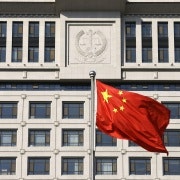From Bo to Weibo, an open China is still on trial
Over the past five days the trial of former Chongqing party boss – and aspirant, princeling, leader – Bo Xilai has transfixed urban China. In a break with past practice, much of the trial was held in public, with delayed reports and transcripts posted on China’s Twitter equivalent, Weibo. In the event, the trial of the century was a damp squib.
Evidence given by Bo’s wife, Gu Kailai, and his once trusted lieutenant, Police Chief Wang Lijun, provided plenty of salacious entertainment, with Gu accusing Bo of corruption and philandering, and he of her being “crazy” and prepared to say anything. Bo also claimed that Wang Lijun was in love with Gu and carried on a long affair with her. Naturally, the foreign media has lapped up all of this too.
The trial also had its revealing moments such as when Bo, confronted with evidence that he had discussed a corrupt deal on the telephone with his wife, said that no corrupt official would ever discuss such things on the telephone. He then added that everyone who knew him knew that when having a conversation with him he demanded that they switch off their mobile phones. Such are the precautions that even the most senior of Chinese leaders must take to protect themselves from surveillance.
Starting with the decision to put Bo on trial following his arrest last year, rather than to treat it as in internal party matter, the handling of this case has been unusual. At five days the trial was much longer than expected, but its public nature was the most significant departure from past practice. Both the accusations made against Bo and his sharp, at times witty, ripostes were relayed to waiting media and to the millions of registered Weibo accounts.
We can only guess at the reasons why President Xi Jinping decided to approve conducting the trial in this way. Of course, one was to create the impression of a fair and open process. This would be, in part, to reinforce the impression that China is moving steadily towards having a rule of law.
Beyond this, the charge sheet against Bo seems to have been watered down so that, as he pointed out, no properly corrupt Chinese official would bother with such trifling amounts. The “abuse of official power” charges also seem to have been quietly dropped.
Bo evidently still enjoys considerable support and protection at the top levels of Chinese politics. To reduce the severity of punishment, the charges against him have also been scaled back. At the same time, it shows the Chinese public that on one hand things are not as bad as people might suspect at the core of the Communist Party and, on the other, that big tigers also get caught and are punished. The trial then has been a show trial, albeit a different kind of theatre to what had been expected. Bo is likely to be sentenced within a month.
With attention focused on the Bo Xilai trial, a more sinister crackdown on internet bloggers has been ramped up. For some months now, controversial websites and blogs have been shut down for “spreading lies” and “disturbing stability”.
Beijing is tightening its grip on China’s already heavily restricted internet by making influential microbloggers uncomfortable when they post material the government doesn’t like.
In May, bestselling Chinese author Murong Xuecun’s (real name Hao Qun) Weibo account, with nearly four million followers, disappeared. So did his profiles on several other social media sites. No explanation was given.
This month, internet censors called in popular microbloggers to meetings and asked them to agree to standards, including keeping social order. State media has also accused some microbloggers of undermining socialism and promoting Western values through lies and negative news.
Last Friday police in Beijing detained Charles Xue, a successful and wealthy Chinese-American venture capital businessman, on suspicion of soliciting a prostitute. Xue has over 12 million followers on his Weibo account. He regularly reposts material critical of the government and campaigns on other popular issues such as food safety and air quality. On Monday, the Party’s official mouthpiece, the People’s Daily, warned high profile bloggers that they should be careful about the information they convey and behave “responsibly”.
The official warnings, and now Xue’s arrest, have had a chilling effect on public discussion on China’s blogs. In recent days, public criticism and exposure on Weibo of official misdeeds and corruption have all but disappeared.
With Bo’s trial out of the way, the government is able to concentrate on preparing for the all-important Third Party Plenum, to be held in the northern autumn. It is still widely expected that the government will tackle much-needed but difficult reforms in the financial sector and possibly even to state-owned enterprises.
The crackdown on critical commentary on the internet may thus be part of the preparations for the Plenum. The Party wants to control the messages and public discourse. It may also be necessary for a harder line to be taken to placate more conservative elements in the Party as it readies itself to roll out a program of more extensive, market-oriented, economic reforms.















